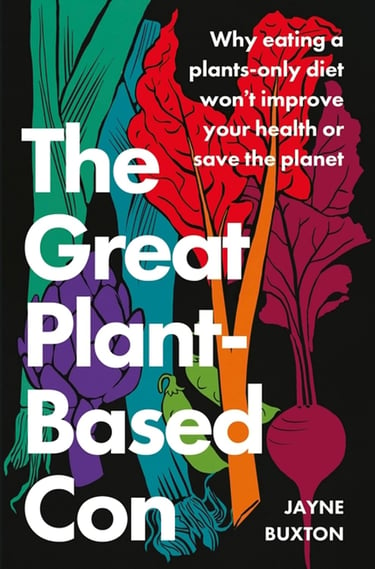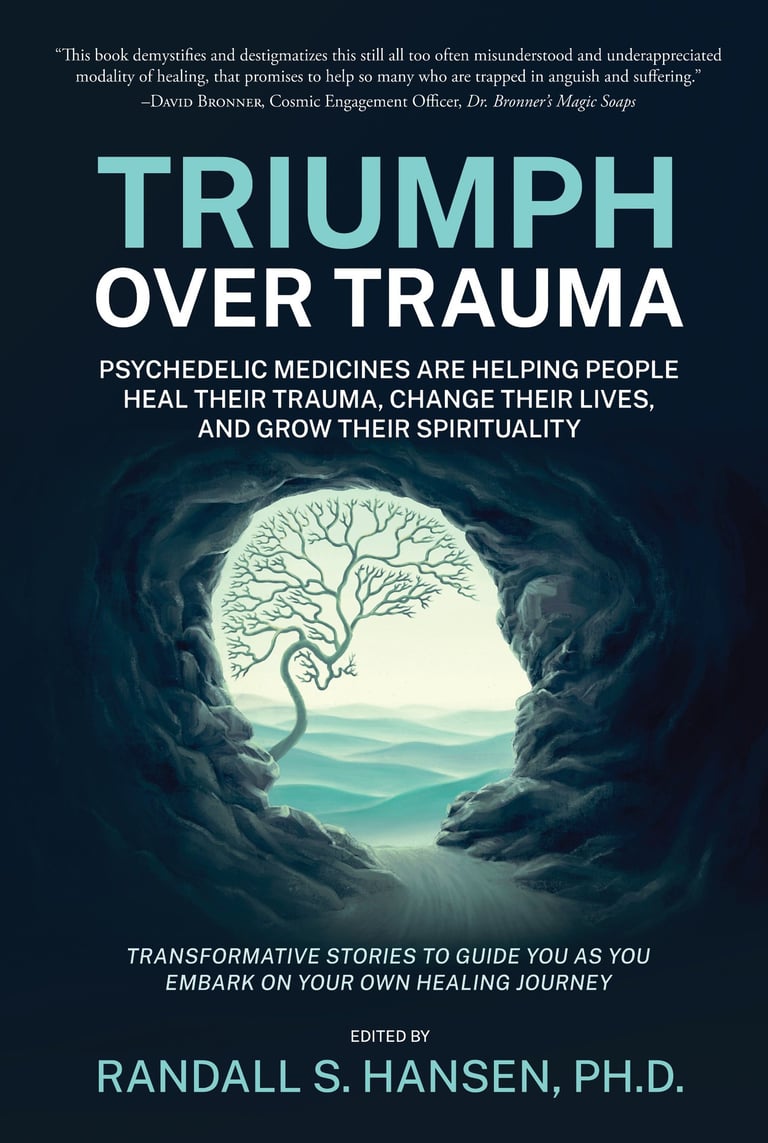Empowering Reading: The Great Plant-Based Con Review
The Great Plant-Based Con: Why Eating a Plants-Only Diet Won’t Improve Your Health or Save the Planet, by Jayne Buxton. 2024. ISBN: 034942795X.
This book is a tour de force for anyone interested in connecting all the dots related to health, nutrition, food production, farming and animal agriculture, health, politics, and climate. To say it is comprehensive would be an understatement, and I think the only reason it isn’t a “best-seller” is its intimidating length of 524 pages.
Is plant-based eating better, healthier? Is eating meat destroying the planet? What is the impact of feedlots, tilling, monoculture, and tilling on the planet? What methods will truly restore and save our soil, keeping our foods nutrient-dense? These and other questions are answered in detail in this thought-provoking book.
The Great Plant-Based Con is a well-researched and well-written book that is a powerful and potentially profound read for all people interested in nutrition and health… our health and the health of the planet.
As the people who follow me know, my food philosophy is that you should eat the real foods (ideally locally sourced) that work best for your body, brain, and gut, whether that is carnivore, omnivore, vegan, or something else. Thus, I read this book with an open mind.
There is so much in this large tome, but I will do my best to pull out the most powerful parts for this review. The book covers four main topics:
Is a plant-based diet better for your health?
Will a plant-based diet save the planet?
Who is advocating for the plant-based diet, and why?
How should we eat?
The author herself admits upfront that she is an omnivore, believing that plant and animal foods work synergistically to generate maximum nutritional benefits for human health… and I am of this same belief.
One of the most interesting discoveries made from reading the book is just how small (but extremely vocal) the number of people who identify as vegan. In the U.S., only 1.5 percent of the population is vegan, with about 4.2 percent vegetarian. Worldwide, about 1.1 percent consider themselves vegan, while almost 22 percent are vegetarian. India has the highest percentage of vegans and vegetarians.
The author’s mantra when writing this book – and one with which I heartily agree: “It’s also a call for an end to the mudslinging between omnivores and plant-based advocates. Less mud, more facts.”
Key Takeaways Covering the Gamut of Farming, Food, Health, and Nutrition
85 percent of global emissions (and more than 95 percent of U.S. emissions) are generated by sources other than animal agriculture. Unfortunately, the idea that livestock generates more emissions than transportation and other industries has been entrenched by targeted anti-meat marketing – and not backed by facts.
Many vitamins, minerals, and essential amino acids provided by meat are often lacking or less bioavailable in plant-based diets.
Industrial, conventional factory farming is abhorrent. “We need to be eating animal-sourced foods that have been sustainably and humanely reared.” Time to end feedlots.
Part of the move to plant-based diets came from faulty research by Ancel Keys and others who blamed fats – especially saturated fats from animal products – as detrimental to our health, with fat and cholesterol blamed for our increasingly worsening chronic health issues. We know today that the real culprits harming our health are refined sugars and carbohydrates.
Most doctors simply follow standard cholesterol panel protocols without looking at these results from a metabolic health lens. Key identifiers are HDL, triglycerides, insulin levels, and fasting blood glucose levels. High triglycerides (a fat in the body), which is a quick measure of insulin resistance, is the real culprit in heart disease. A key ratio that is also important is triglycerides to HDL, which is “vastly more predictive than the LDL value on its own.” A ratio of total cholesterol to HDL is also a good indicator.
Insulin resistance is the true threat to health, and occurs when the body keeps pumping insulin, but the cells do not respond to it, so it keeps pumping more. One of the experts the author cites calls insulin resistance one of the three points on an “axis of illness,” which also includes obesity and inflammation. Insulin resistance leads to prediabetes and then type-2 diabetes, and is implicated as a critical element in the development of many diseases.
She cites author and professor Ben Bikman, Ph.D., who states that insulin resistance is implicated in many health conditions, including heart disease, brain and neurological disorders, reproductive ill-health, cancer, aging and skin disorders, gastrointestinal disorders, metabolic syndrome, and obesity.
She cites the authors of The Hybrid Diet who assert that “years of a high carbohydrate diet, which creates regular spikes in blood glucose each and every day, is one of the main drivers of high insulin levels and insulin resistance.”
Insulin resistance can be improved by a reduction in carbohydrate consumption, not by the avoidance of cholesterol and meats.
Where we find ourselves today: “in the midst of a war on meat and other animal foods, most people still believe that LDL cholesterol is inherently bad and that eating meat, dairy, and saturated animal fats contributes directly to high LDL.” (All incorrect, FYI.)
Children, especially babies, should never be on a plant-based diet and should not be consuming plant-based milk over real breast milk or formula.
Provides a lengthy discussion of plant anti-nutrients, which can negatively affect some people, including oxalates, phytic acid, and lectins.
Discusses the problems with “vegetable” seed oils, focusing on the wide imbalance we have today between omega-6 and omega-3 fatty acids. She cites experts who state there is compelling evidence showing that omega-3s protect against inflammation, whereas omega-6s promote heart disease.
For vegans, much like everyone else, the key to health is eating real foods – not plant-based ultra-processed, ultra-refined products that contain ingredients detrimental to health. One expert adds that plant-based processed foods is a risk factor for increased depression.
Takes a whole chapter explaining why refined sugar is the “biggest of the bad guys.” Refined sugar was hypothesized to be the true root cause of disease, but one researcher (Ancel Keys) defended his stance that fat was the culprit until the day he died, causing decades of incorrect nutritional advice and a complete change in how processed foods are made.
Discusses the connection between a high-carbohydrate diet and cancer, citing Dr. David Harper’s garden analogy: high-carbohydrate diets act like the rain and sun for cancer cells, feeding their glucose addiction and causing them to grow. She cites several experts who recommend the ketogenic diet for limiting insulin and upregulates the immune system.
Includes a short review of the carnivore diet, examining the stories and science behind the movement. The stories all tell of the power of an animal-based diet to resolve many health problems, including autoimmune disorders.
A whole chapter on the truth about CO2, methane, and cow burps, where the author goes into details, crunching the numbers and showing how anti-meat people have skewed the data in their favor. She also details how regenerative agriculture has the potential to reduce net farming emissions by up to 80 percent.
An interesting discussion of the use of green (collected from rainwater) and blue (sourced from wells) water for both agriculture and ranching, making the case that beef production uses much less blue water than growing almonds and other nuts, and comparable to growing fruits and vegetables. FYI, almond milk requires 20 times as much blue water than does milk from cows.
The author even tackles the soil versus dirt issue; if you aren’t aware, we are losing valuable soil annually through conventional farming, while regenerative farming is all about building soil – as well as protecting the soil microbiome. Conventional farming also uses synthetic chemical fertilizers and pesticides. Healthy soil provides nutrient-dense food, sequesters carbon, protects biodiversity and soaks up heavy rains (preventing erosion and keeping more moisture in the soil).
Hits on the topic that raising/growing ANY foods has an impact on the environment in one form or another. For example, in growing massive monoculture crops, these farms kill thousands of animals, mostly in the form of moles, voles, and ground squirrels, but also insects and birds, and other wild game, where farming has been newly established in what were wildlife habitats. All farming and ranching has an impact on nature, but our goal should always be to work with nature, not against it.
If we eliminated animal agriculture, not only would we still be destroying our soil with conventional farming, but there would be no manure to naturally fertilize crops, and we would replace ranching operations with factories producing fake plant-based meat/proteins. More industry, less nature, in the creation of our “foods.”
Instead of factories producing fake meat proteins, the future should involve regenerative farming practices, including the use of animal agriculture. And yes, we can feed the world using regenerative farming methods. Unfortunately, right now, only about 5 percent of farms in the U.S. are truly regenerative.
She cites a Rodale Institute white paper that stresses that there is no shortage of food in the world – only political and social factors that prevent food from reaching the hands of people who need it.
In terms of a diet that is healthy and supports the planet, she cites Dr. Gary Fettke’s prescription: “Eat fresh, local, seasonal, whole food, based on your environment and cultural beliefs, avoiding added sugars and processed foods.”
Final Thoughts About The Great Plant-Based Con
Regardless of whether you are a carnivore, omnivore, vegetarian, or vegan, this book will challenge some of your assumptions, force you to consider alternative viewpoints, and provide you with an extensive amount of information, all backed by research. (The book is so long and the citations so extensive, the citations can only be found on her website in an attempt to slightly reduce the size of the book.)
Find more book reviews and advice for living a happy, healthy, and healing life here.
Dr. Randall Hansen is an evangelist, educator, and thought-leader... helping the world heal from past trauma and the poor food system. He is founder and CEO of EmpoweringSites.com, a network of empowering and transformative Websites, including EmpoweringAdvice.com.
He is the author of the groundbreaking Triumph Over Trauma: Psychedelic Medicines are Helping People Heal Their Trauma, Change Their Lives, and Grow Their Spirituality and the well-received HEAL! Wholeistic Practices to Help Clear Your Trauma, Heal Yourself, and Live Your Best Life.
The third book in the Wholeistic Healing Trilogy is the game-changing The HEALing Revolution Diet: A Science-based Approach to Heal Your Gut, Reverse Chronic Illnesses, Lose Weight, Clear Your Mind, and Increase Longevity.
Dr. Hansen's focus and advocacy center around true health and healing journeys that results in being able to live an authentic life filled with peace, joy, love. Learn more by visiting his personal Website, RandallSHansen.com. You can also check out Dr. Randall Hansen on LinkedIn.








